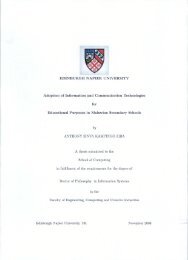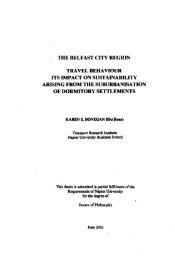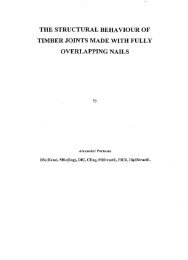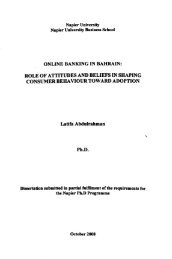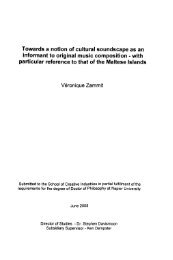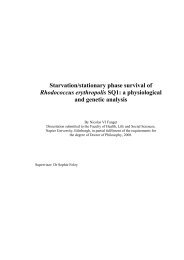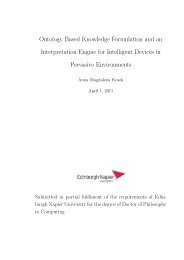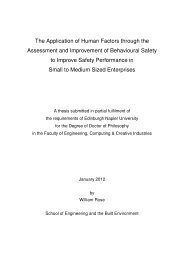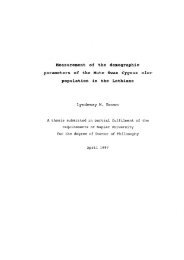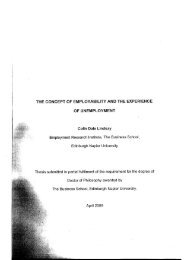- Page 1 and 2: Financial Liberalisation in Mauriti
- Page 3 and 4: elated to real interest rate. This
- Page 5 and 6: DECLARATION I, Jean Karl JOUAN, her
- Page 7 and 8: Chapter 3 Institutional Aspects, Em
- Page 9 and 10: 6.7 Summary 220 Chapter 7 Stock Mar
- Page 11 and 12: LIST OF TABLES Tables Page Chapter
- Page 13 and 14: Chapter 7 1.7 Stock Market Developm
- Page 15 and 16: Change 2.8 Tests of Equality of var
- Page 17 and 18: LIST OF CHARTS Figures Page Chapter
- Page 19 and 20: 10.7 200 Trading Sessions before an
- Page 21 and 22: GLOSSARY OF ABBREVIATIONS ACF Autoc
- Page 23 and 24: NBF1 Non Bank Financial Institution
- Page 25 and 26: Chapter I 1.1 The Country INTRODUCT
- Page 27 and 28: from amongst the newly independent
- Page 29 and 30: cyclone in 1980 and (ii) the world
- Page 31 and 32: Because the unemployment level star
- Page 33 and 34: 5. What are the changes in financia
- Page 35 and 36: had to be limited to a sample of on
- Page 37 and 38: assets (money) to productive illiqu
- Page 39: Chapter 8 presents an econometric a
- Page 43 and 44: market. The crux of his argument is
- Page 45 and 46: eroded with deflation. They therefo
- Page 47 and 48: However, today notes and coins in c
- Page 49 and 50: High interest rates were charged be
- Page 51 and 52: pushed towards government intervent
- Page 53 and 54: ecome more appropriate to adopt fin
- Page 55 and 56: " nen a strong impulse to invest is
- Page 57 and 58: pre-condition. Intermediaries set u
- Page 59 and 60: Figure 1.2 Saving and Investment un
- Page 61 and 62: The higher the real deposit rate of
- Page 63 and 64: According to the Shaw analysis, whe
- Page 65 and 66: spread, Brock and Suarez (2000) obs
- Page 67 and 68: productivity of the investment proj
- Page 69 and 70: market50 where "depositors" could g
- Page 71 and 72: 2.5 Extensions of the McKinnon and
- Page 73 and 74: financed) Ratio of loans to money s
- Page 75 and 76: The policy implication is then to r
- Page 77 and 78: also by deposits from the tradition
- Page 79 and 80: investment. Since a proportion of t
- Page 81 and 82: output in response to higher intern
- Page 83 and 84: It must be observed that while Chin
- Page 85 and 86: to deposit 30% of the loan at the c
- Page 87 and 88: Chapter 3 3.1 Introduction INSTITUT
- Page 89 and 90: firms (shares and bonds) into liqui
- Page 91 and 92:
3.3 Stock Market Development th The
- Page 93 and 94:
Cho (1986) argues that a well-funct
- Page 95 and 96:
Kumar and Tsetsekos (1998) highligh
- Page 97 and 98:
[Singh, 1997, pp. 771-782] Using da
- Page 99 and 100:
The question of direction of causal
- Page 101 and 102:
The McKinnon and Shaw models and th
- Page 103 and 104:
process was initiated in an environ
- Page 105 and 106:
An interesting point to note is tha
- Page 107 and 108:
so as to weaken the market power of
- Page 109 and 110:
(1) Managing the reform rather than
- Page 111 and 112:
Equally inherited in many African c
- Page 113 and 114:
commitment of funds to risk concent
- Page 115 and 116:
Further by classifying assets in fo
- Page 117 and 118:
In recent years, with structural de
- Page 119 and 120:
improved information and communicat
- Page 121 and 122:
of the agency and reduces moral haz
- Page 123 and 124:
The unfolding of economic events af
- Page 125 and 126:
countries with banking crises since
- Page 127 and 128:
of loanable funds. However, this ef
- Page 129 and 130:
Buffle points out that increased sa
- Page 131 and 132:
micro foundation of Keynesian macro
- Page 133 and 134:
loanable funds were in fact allocat
- Page 135 and 136:
equilibrium is a credit rationing e
- Page 137 and 138:
Development Bank in the early 1980s
- Page 139 and 140:
ecause depositors consider that suc
- Page 141 and 142:
the recent financial crises in emer
- Page 143 and 144:
institutions and those that are not
- Page 145 and 146:
In spite of virulent attacks from s
- Page 147 and 148:
asymmetry of information does not s
- Page 149 and 150:
can guarantee that a depression or
- Page 151 and 152:
(a) Refinancing on less favourable
- Page 153 and 154:
acquisition of financial assets. Su
- Page 155 and 156:
New-Classicals as unwarranted obstr
- Page 157 and 158:
After the oil shocks in the 1970's
- Page 159 and 160:
to the Latin American economies hel
- Page 161 and 162:
(Minsky 1982). Their problems would
- Page 163 and 164:
psychology and prevents any bandwag
- Page 165 and 166:
would require an implausible surren
- Page 167 and 168:
Chapter 5 5.1. An Overview THE MAUR
- Page 169 and 170:
Figure 1.5 Financial Sector in Maur
- Page 171 and 172:
The above table gives an indication
- Page 173 and 174:
Table 3.5 Market Share of MCB & SBM
- Page 175 and 176:
depositors who believe in the "too
- Page 177 and 178:
The banking concentration issue in
- Page 179 and 180:
more than doubled, from 27% pre-lib
- Page 181 and 182:
Table 8.5 Share of Assets among Ins
- Page 183 and 184:
Table 10.5 Share of Gross long-term
- Page 185 and 186:
deposit of Rs8rn with the Financial
- Page 187 and 188:
on all weekdays 185 . Tier 2 is the
- Page 189 and 190:
member of the International Organis
- Page 191 and 192:
(3) Facilitating the ongoing privat
- Page 193 and 194:
Using standard deviation as a forma
- Page 195 and 196:
5.5 The Offshore Sector (Global Bus
- Page 197 and 198:
Financial Intelligence Uniell of su
- Page 199 and 200:
the total investment representing U
- Page 201 and 202:
managed by Insurance Companies), Co
- Page 203 and 204:
I" Stage: The Financial Services Co
- Page 205 and 206:
Chapter 6 6.1. Introduction LIBERAL
- Page 207 and 208:
The process of financial liberalisa
- Page 209 and 210:
with the economic growth strategy o
- Page 211 and 212:
As banks competed for offering loan
- Page 213 and 214:
The start of open market operations
- Page 215 and 216:
date and price. The broad monetary
- Page 217 and 218:
Table 5.6 Changes in Real Interest
- Page 219 and 220:
3. The real interest rate on saving
- Page 221 and 222:
egular issues while promoting long-
- Page 223 and 224:
permits/licenses added competitive
- Page 225 and 226:
some corporate bodies to borrow dir
- Page 227 and 228:
Figure 5.6 6- 4- 2- 0- /// -21 64 B
- Page 229 and 230:
allowed to trade foreign currencies
- Page 231 and 232:
Capital Base To tighten prudential
- Page 233 and 234:
Table 8.6 Changes in Capital Ratio
- Page 235 and 236:
Table 11.6 As at June Non-Performin
- Page 237 and 238:
Table 13.6 Figure 6.6 Comnonentq nf
- Page 239 and 240:
from six monthly audited accounts b
- Page 241 and 242:
6.6.2 Reforms and Banking Crisis In
- Page 243 and 244:
Table 14.6 Bank Deposit Crisis and
- Page 245 and 246:
are adequately capitalized and have
- Page 247 and 248:
Table 1.7 Stock Market Development
- Page 249 and 250:
Table 2.7 Gross National Savings Ra
- Page 251 and 252:
Table 3.7 Comparison with Sub-Sahar
- Page 253 and 254:
elow the level reached in developed
- Page 255 and 256:
7.2 Stock Market Liberalisation 7.2
- Page 257 and 258:
Figure 2.7 Accumulated Foreign Port
- Page 259 and 260:
Table 7.7 Stability Test with Break
- Page 261 and 262:
7.2.3 Random Walk of Stock Prices I
- Page 263 and 264:
Kawakatsu and Morey (1999) and Magh
- Page 265 and 266:
Figure 6.7 Figure 7.7 Correlog ram:
- Page 267 and 268:
A visual display of the plot of the
- Page 269 and 270:
The probability value of the test s
- Page 271 and 272:
Table 14.7 Breusch-Godfrey Serial C
- Page 273 and 274:
Table 20.7 AutoRegression Output af
- Page 275 and 276:
mean and higher variability of retu
- Page 277 and 278:
components: The model considers tot
- Page 279 and 280:
working out each asset return at th
- Page 281 and 282:
PAD HWF NMHL CAUDAN 1990 N. A N. A
- Page 283 and 284:
enough evidence to reject the null
- Page 285 and 286:
Figure 13.7 50 40 30 20 10 -10 -20
- Page 287 and 288:
100 80 60 40 20 0 -20 -40 -60 -10 F
- Page 289 and 290:
The F statistic falls well within t
- Page 291 and 292:
Figure 16.7 Comparative Growth in T
- Page 293 and 294:
Figure 17.7 Stock Price Index Relat
- Page 295 and 296:
een more volatile after liberalisat
- Page 297 and 298:
1. A shift towards a portfolio comp
- Page 299 and 300:
stability is therefore run with 199
- Page 301 and 302:
Table 3.8 Tests of Equality of Mean
- Page 303 and 304:
this is confirmed by the regression
- Page 305 and 306:
Table 5.8 Ramsey RESET Test: Specif
- Page 307 and 308:
Table 7.8 Redundant Variable Test R
- Page 309 and 310:
There is a first indication of no s
- Page 311 and 312:
Table 10.8 White Heteroskedasticity
- Page 313 and 314:
Table 11.8 Money Equation: Pooled S
- Page 315 and 316:
summary. SWA-REER SWA 0.019271 0.01
- Page 317 and 318:
I Table 13.8 Significant Coefficien
- Page 319 and 320:
IA Currency + Demand DEPTH and inte
- Page 321 and 322:
Table 14.8 Growth Regression Result
- Page 323 and 324:
A different approach is now adopted
- Page 325 and 326:
Log(INV), --ý C3+a3., Log(RGDP), +
- Page 327 and 328:
Before running the test of no-causa
- Page 329 and 330:
PP Test Statistic -1.199070 1% Crit
- Page 331 and 332:
D(LOG(PRIVY)) does not Granger Caus
- Page 333 and 334:
Table 19.8 Date: 09/22/04 Time: 10:
- Page 335 and 336:
Table 20.8 Date: 09/22/04 Time: 10:
- Page 337 and 338:
0.1321213189*D(LOG(EXPO(-2») + 0.2
- Page 339 and 340:
LOG(RGDP(-l)) LOG(RGDP(-l)) does no
- Page 341 and 342:
_D(LOG(INV)) D(LOG(PRIVY)) does not
- Page 343 and 344:
Cause D(LOG(RGDP(-l))) D(LOG(RGDP(-
- Page 345 and 346:
D(LOG(PRIVY)) D(LOG(INV(-l))) does
- Page 347 and 348:
D(LOG(EXPO)) D(LOG(EXPO)) D(LOG(INV
- Page 349 and 350:
model shows a positive relationship
- Page 351 and 352:
Table 22.8 Equality Tests Test for
- Page 353 and 354:
li, t = CLO +CLI 13t 7 ýZU-2 ii. t
- Page 355 and 356:
Table 24.8 Regression Results befor
- Page 357 and 358:
8.5 Liberalisation and Banking Spre
- Page 359 and 360:
Log(SPRF, 4D), = C, +a,., Log(SPREA
- Page 361 and 362:
0.01557554697*MKTSHARE(-2) + 0.5556
- Page 363 and 364:
0.208648 6.076617 15.41 20.04 At mo
- Page 365 and 366:
to credit after liberalisation and
- Page 367 and 368:
measurement of the mini banking cri
- Page 369 and 370:
aiming at dampening any band-wagon
- Page 371 and 372:
with such changes banks behaviour c
- Page 373 and 374:
promote the development of banks an
- Page 375 and 376:
, REFERIENCES 1. Ackert, L. F., Chu
- Page 377 and 378:
18. BasantRoi, R. (2001)AddressbyR.
- Page 379 and 380:
34. Brash, D. T. (1997): "Dr. Brash
- Page 381 and 382:
49. Collier, P., and Mayer, C. (198
- Page 383 and 384:
64. Demetriades, P., and Liuntel, K
- Page 385 and 386:
82. Felix, D (200 1) "y Internation
- Page 387 and 388:
100. Goldsmith, R. W. (1969) Financ
- Page 389 and 390:
120'. IMF (1999) (a) A Report on th
- Page 391 and 392:
140. Keynes, J. M. The Collected Wr
- Page 393 and 394:
160. Levhari, D and Patinkin, D (19
- Page 395 and 396:
179. Mc Kinnon, R. (1973) Money and
- Page 397 and 398:
196. Patel, S and Sarkar A (1998) "
- Page 399 and 400:
211. Sharpe, W. (1964) " Capital As
- Page 401 and 402:
23 1. Subrahmanyam, A. (1994) "Circ
- Page 403 and 404:
250. Veblen, T. (1899), 'Indusrial
- Page 405 and 406:
APPENDICES xxxii
- Page 407 and 408:
Tablel. 2 Appendix 2 Summary of Mac
- Page 409 and 410:
5 Interest rate Real deposit rate d
- Page 411 and 412:
Development developed financial int
- Page 413 and 414:
peg was also present in the Latin A
- Page 415 and 416:
Appendix 5 Short History of Banking
- Page 417 and 418:
as a marketing instrument in the pr
- Page 419 and 420:
Appendix 7 Chronology of Liberalisa
- Page 421 and 422:
components: - Appendix 9 Basel Prov
- Page 423:
to ensure that 20% of their substan



